Comprehensive Solutions: Corporate Financial Strategy Module
VerifiedAdded on 2023/06/18
|16
|2513
|241
Homework Assignment
AI Summary
This assignment provides comprehensive solutions to a range of questions related to Corporate Financial Strategy. Topics covered include share valuation using dividend discount models, the law of one price, debt valuation, merger analysis, futures contract calculations, time value of money problems, and bond valuation with duration and volatility analysis. The solutions also address the Efficient Market Hypothesis (EMH) and its implications for investment strategies, including discussions on its weak, semi-strong, and strong forms, along with criticisms and real-world examples. The document offers detailed calculations and explanations for each question, making it a valuable resource for understanding key concepts in corporate finance. Desklib provides this and many other solved assignments and past papers.
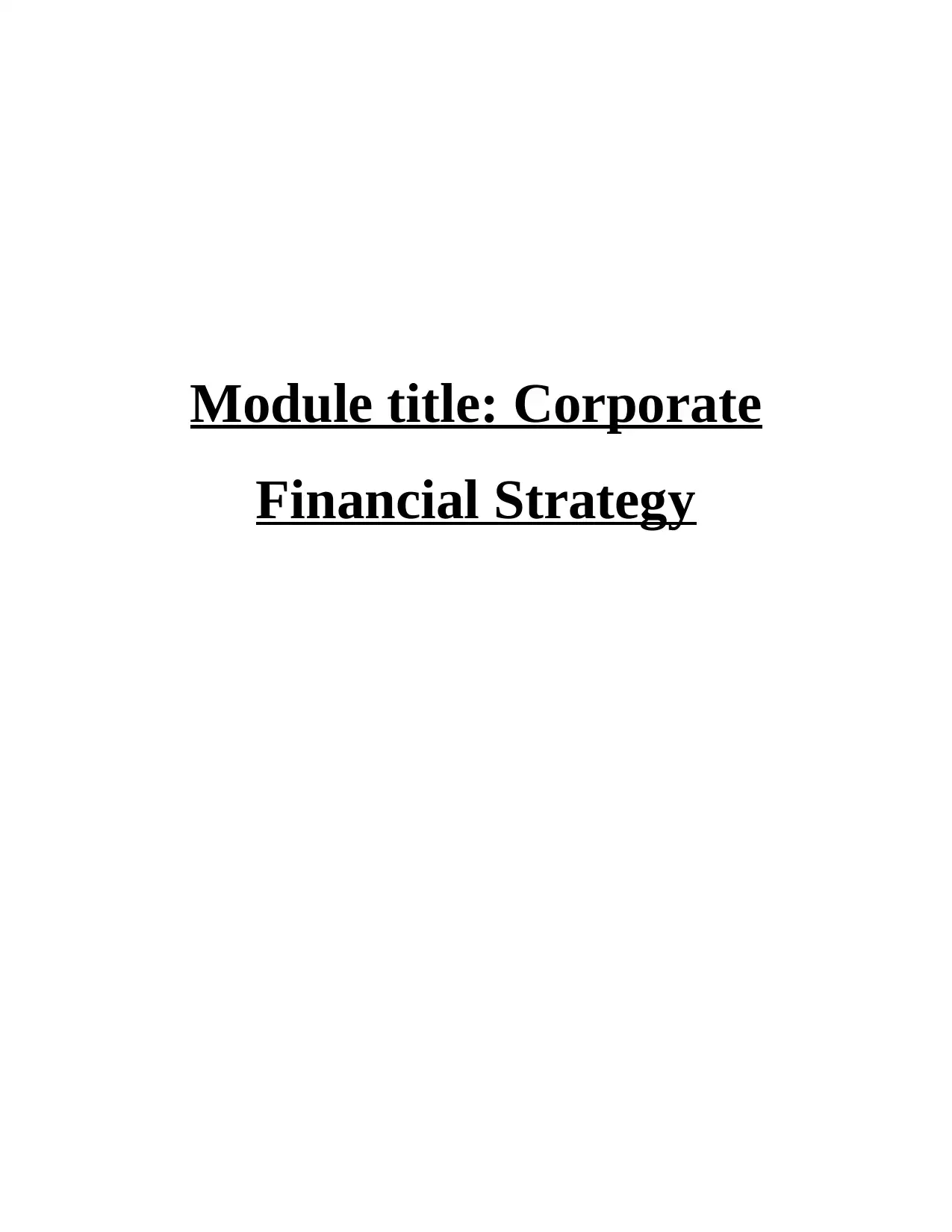
Module title: Corporate
Financial Strategy
Financial Strategy
Paraphrase This Document
Need a fresh take? Get an instant paraphrase of this document with our AI Paraphraser
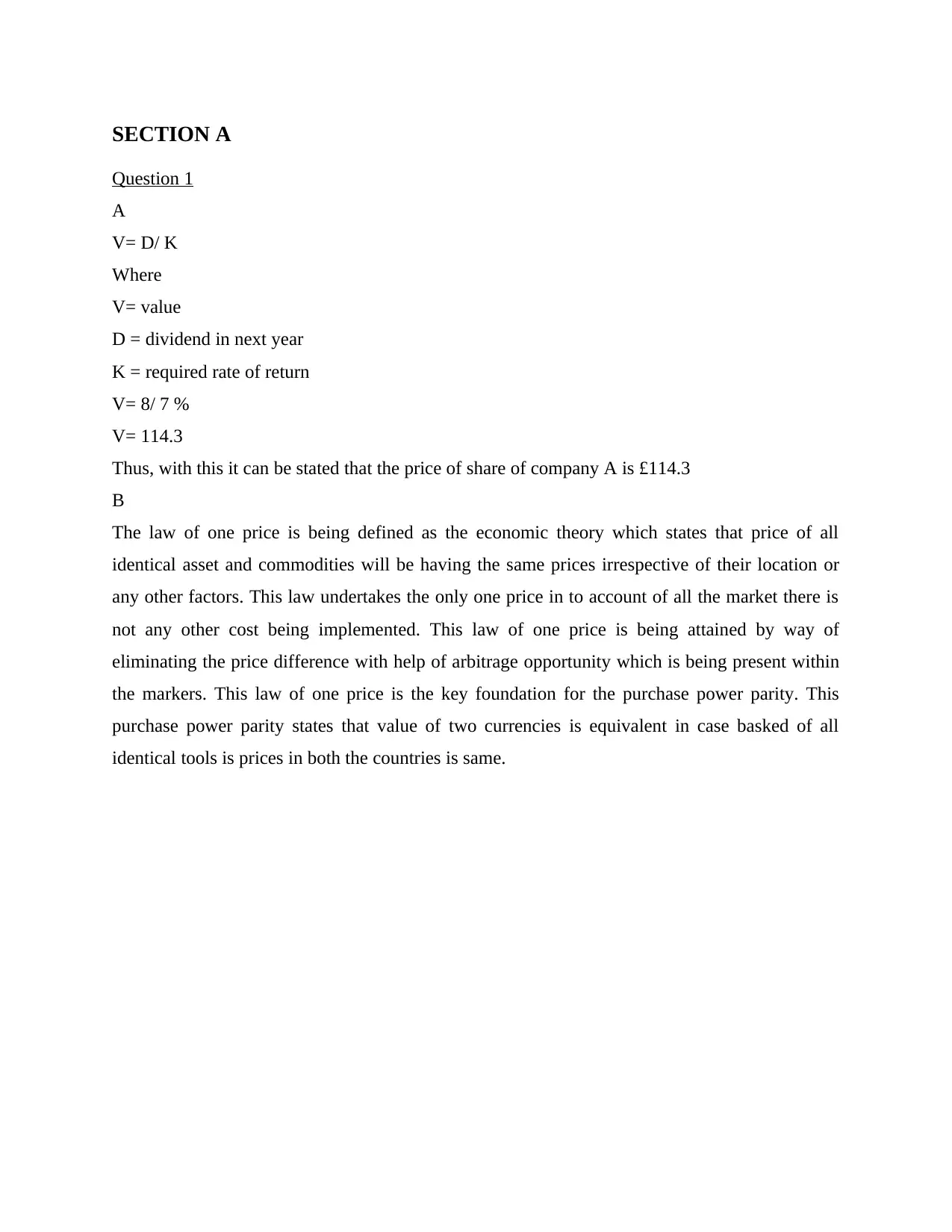
SECTION A
Question 1
A
V= D/ K
Where
V= value
D = dividend in next year
K = required rate of return
V= 8/ 7 %
V= 114.3
Thus, with this it can be stated that the price of share of company A is £114.3
B
The law of one price is being defined as the economic theory which states that price of all
identical asset and commodities will be having the same prices irrespective of their location or
any other factors. This law undertakes the only one price in to account of all the market there is
not any other cost being implemented. This law of one price is being attained by way of
eliminating the price difference with help of arbitrage opportunity which is being present within
the markers. This law of one price is the key foundation for the purchase power parity. This
purchase power parity states that value of two currencies is equivalent in case basked of all
identical tools is prices in both the countries is same.
Question 1
A
V= D/ K
Where
V= value
D = dividend in next year
K = required rate of return
V= 8/ 7 %
V= 114.3
Thus, with this it can be stated that the price of share of company A is £114.3
B
The law of one price is being defined as the economic theory which states that price of all
identical asset and commodities will be having the same prices irrespective of their location or
any other factors. This law undertakes the only one price in to account of all the market there is
not any other cost being implemented. This law of one price is being attained by way of
eliminating the price difference with help of arbitrage opportunity which is being present within
the markers. This law of one price is the key foundation for the purchase power parity. This
purchase power parity states that value of two currencies is equivalent in case basked of all
identical tools is prices in both the countries is same.
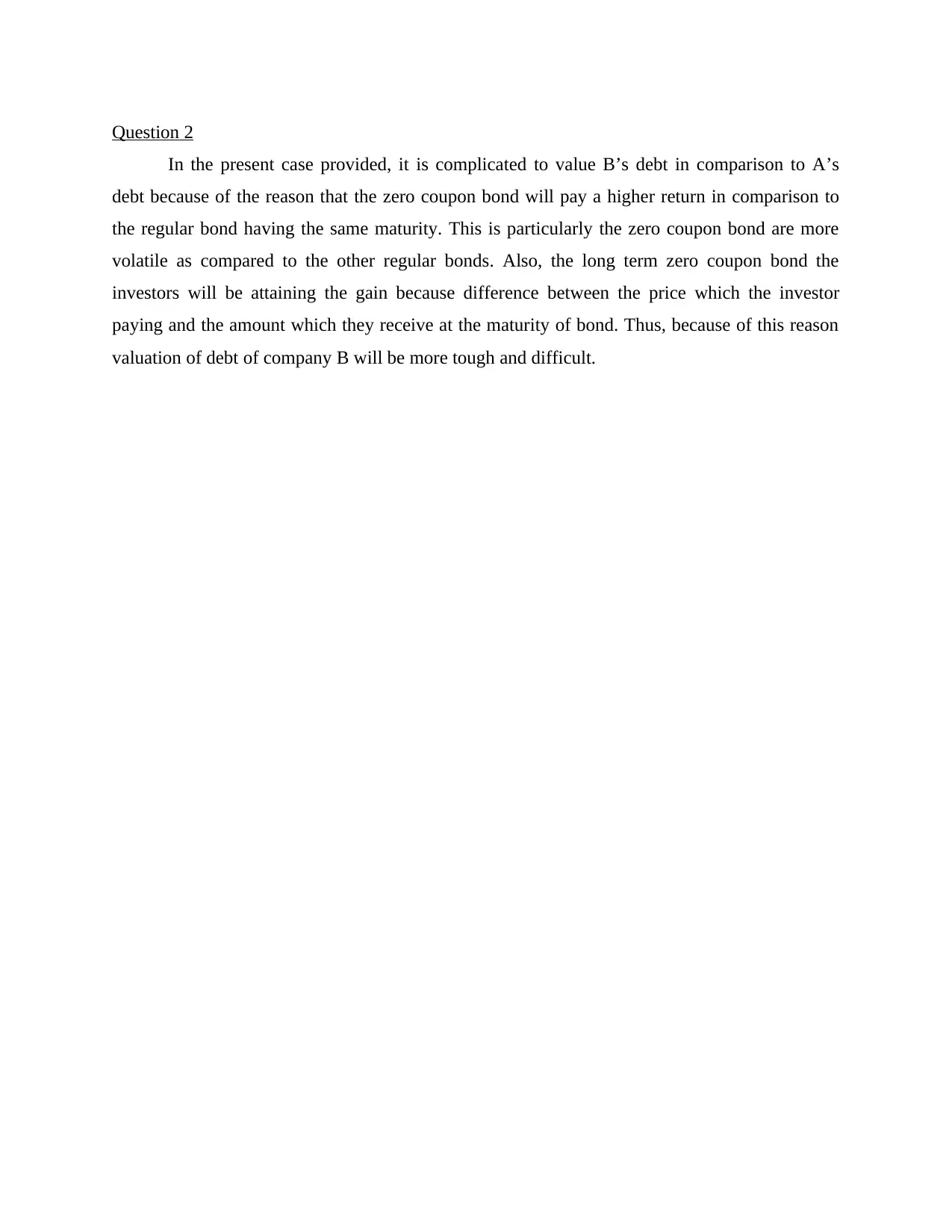
Question 2
In the present case provided, it is complicated to value B’s debt in comparison to A’s
debt because of the reason that the zero coupon bond will pay a higher return in comparison to
the regular bond having the same maturity. This is particularly the zero coupon bond are more
volatile as compared to the other regular bonds. Also, the long term zero coupon bond the
investors will be attaining the gain because difference between the price which the investor
paying and the amount which they receive at the maturity of bond. Thus, because of this reason
valuation of debt of company B will be more tough and difficult.
In the present case provided, it is complicated to value B’s debt in comparison to A’s
debt because of the reason that the zero coupon bond will pay a higher return in comparison to
the regular bond having the same maturity. This is particularly the zero coupon bond are more
volatile as compared to the other regular bonds. Also, the long term zero coupon bond the
investors will be attaining the gain because difference between the price which the investor
paying and the amount which they receive at the maturity of bond. Thus, because of this reason
valuation of debt of company B will be more tough and difficult.
⊘ This is a preview!⊘
Do you want full access?
Subscribe today to unlock all pages.

Trusted by 1+ million students worldwide
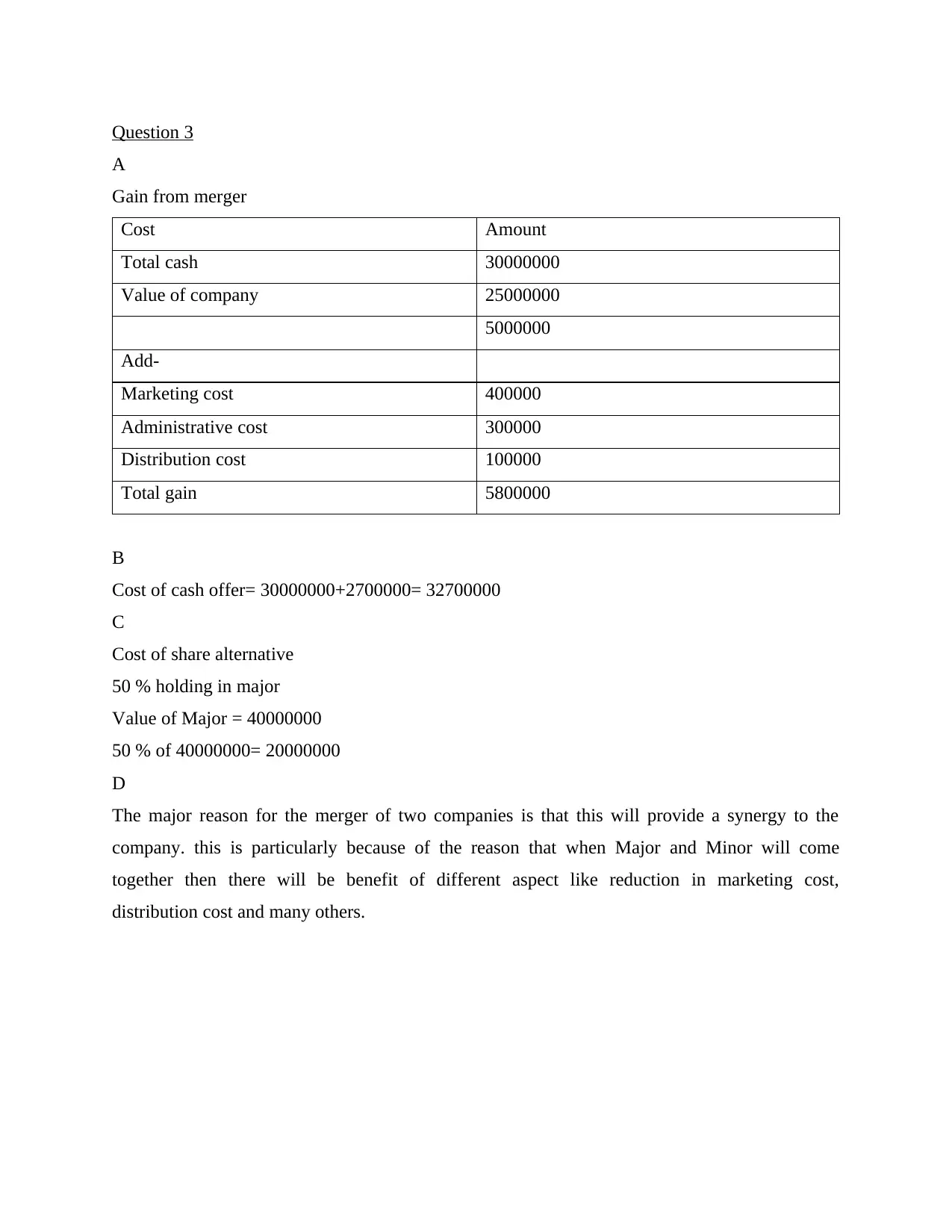
Question 3
A
Gain from merger
Cost Amount
Total cash 30000000
Value of company 25000000
5000000
Add-
Marketing cost 400000
Administrative cost 300000
Distribution cost 100000
Total gain 5800000
B
Cost of cash offer= 30000000+2700000= 32700000
C
Cost of share alternative
50 % holding in major
Value of Major = 40000000
50 % of 40000000= 20000000
D
The major reason for the merger of two companies is that this will provide a synergy to the
company. this is particularly because of the reason that when Major and Minor will come
together then there will be benefit of different aspect like reduction in marketing cost,
distribution cost and many others.
A
Gain from merger
Cost Amount
Total cash 30000000
Value of company 25000000
5000000
Add-
Marketing cost 400000
Administrative cost 300000
Distribution cost 100000
Total gain 5800000
B
Cost of cash offer= 30000000+2700000= 32700000
C
Cost of share alternative
50 % holding in major
Value of Major = 40000000
50 % of 40000000= 20000000
D
The major reason for the merger of two companies is that this will provide a synergy to the
company. this is particularly because of the reason that when Major and Minor will come
together then there will be benefit of different aspect like reduction in marketing cost,
distribution cost and many others.
Paraphrase This Document
Need a fresh take? Get an instant paraphrase of this document with our AI Paraphraser
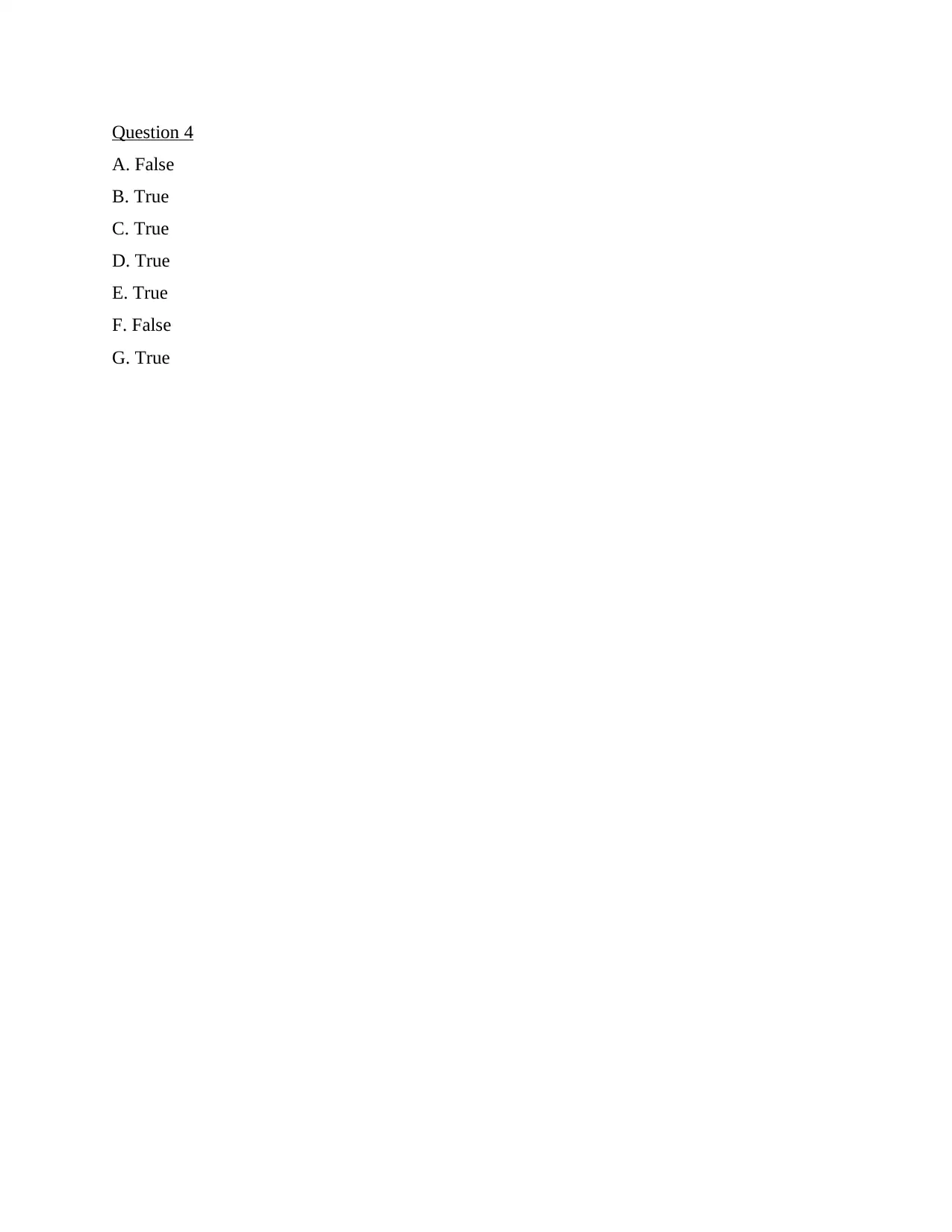
Question 4
A. False
B. True
C. True
D. True
E. True
F. False
G. True
A. False
B. True
C. True
D. True
E. True
F. False
G. True
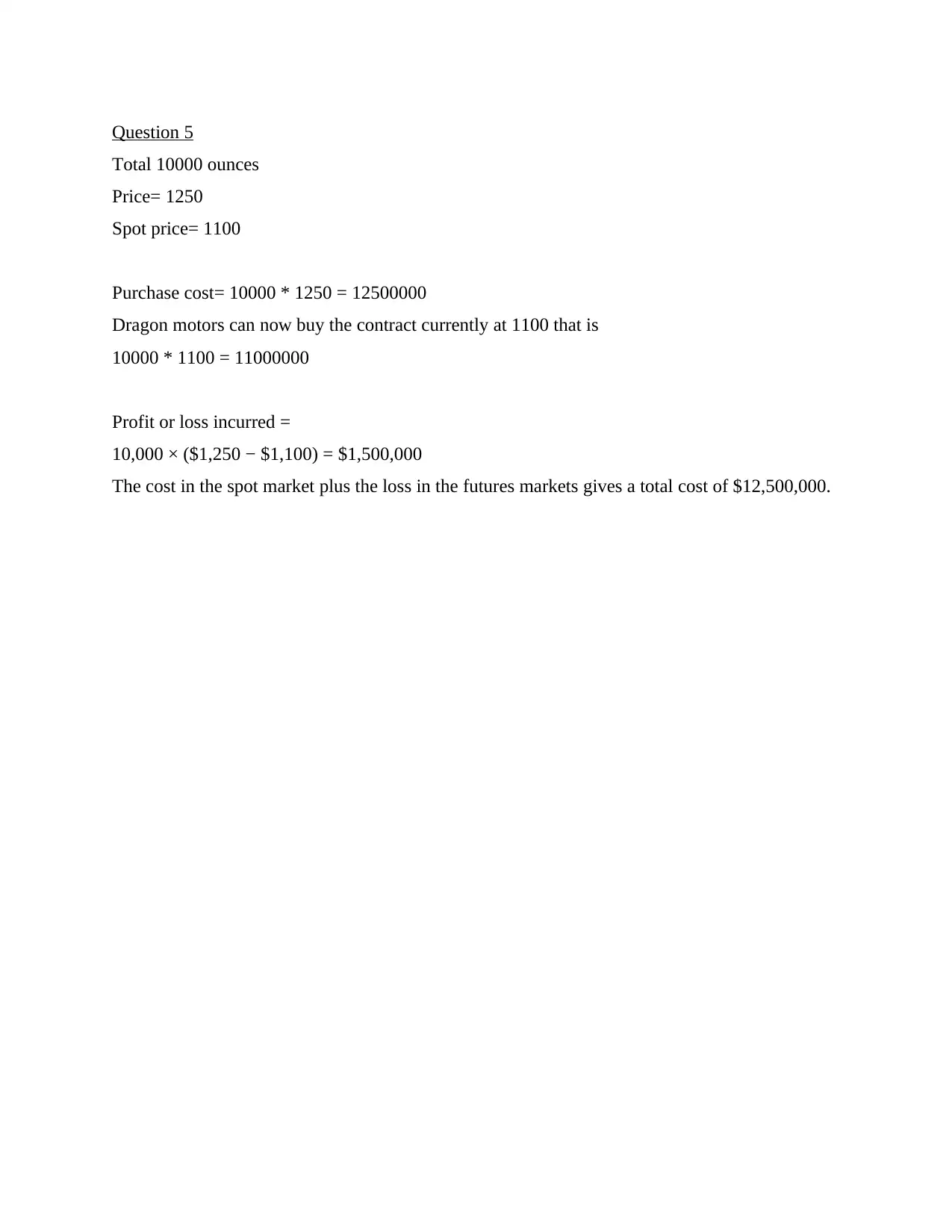
Question 5
Total 10000 ounces
Price= 1250
Spot price= 1100
Purchase cost= 10000 * 1250 = 12500000
Dragon motors can now buy the contract currently at 1100 that is
10000 * 1100 = 11000000
Profit or loss incurred =
10,000 × ($1,250 − $1,100) = $1,500,000
The cost in the spot market plus the loss in the futures markets gives a total cost of $12,500,000.
Total 10000 ounces
Price= 1250
Spot price= 1100
Purchase cost= 10000 * 1250 = 12500000
Dragon motors can now buy the contract currently at 1100 that is
10000 * 1100 = 11000000
Profit or loss incurred =
10,000 × ($1,250 − $1,100) = $1,500,000
The cost in the spot market plus the loss in the futures markets gives a total cost of $12,500,000.
⊘ This is a preview!⊘
Do you want full access?
Subscribe today to unlock all pages.

Trusted by 1+ million students worldwide
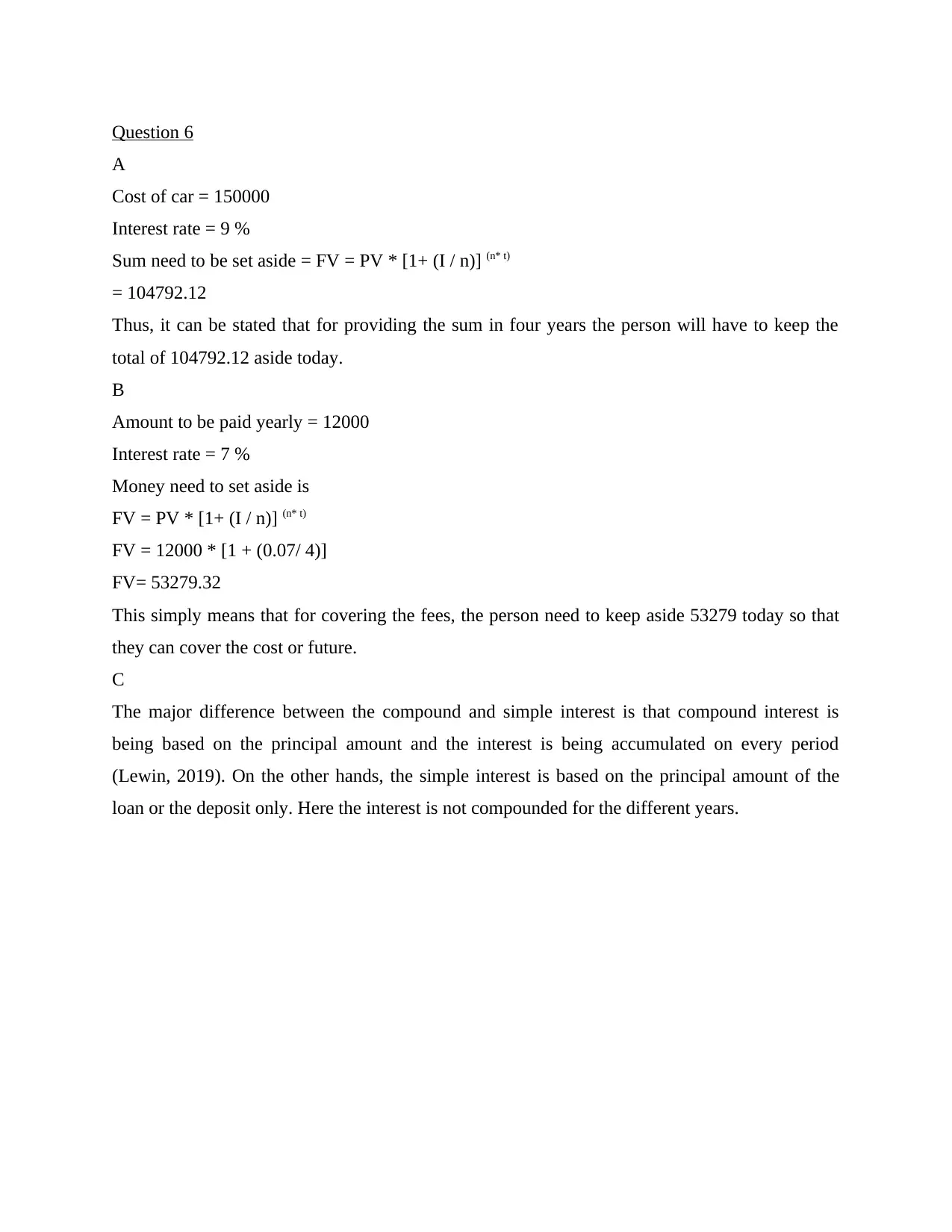
Question 6
A
Cost of car = 150000
Interest rate = 9 %
Sum need to be set aside = FV = PV * [1+ (I / n)] (n* t)
= 104792.12
Thus, it can be stated that for providing the sum in four years the person will have to keep the
total of 104792.12 aside today.
B
Amount to be paid yearly = 12000
Interest rate = 7 %
Money need to set aside is
FV = PV * [1+ (I / n)] (n* t)
FV = 12000 * [1 + (0.07/ 4)]
FV= 53279.32
This simply means that for covering the fees, the person need to keep aside 53279 today so that
they can cover the cost or future.
C
The major difference between the compound and simple interest is that compound interest is
being based on the principal amount and the interest is being accumulated on every period
(Lewin, 2019). On the other hands, the simple interest is based on the principal amount of the
loan or the deposit only. Here the interest is not compounded for the different years.
A
Cost of car = 150000
Interest rate = 9 %
Sum need to be set aside = FV = PV * [1+ (I / n)] (n* t)
= 104792.12
Thus, it can be stated that for providing the sum in four years the person will have to keep the
total of 104792.12 aside today.
B
Amount to be paid yearly = 12000
Interest rate = 7 %
Money need to set aside is
FV = PV * [1+ (I / n)] (n* t)
FV = 12000 * [1 + (0.07/ 4)]
FV= 53279.32
This simply means that for covering the fees, the person need to keep aside 53279 today so that
they can cover the cost or future.
C
The major difference between the compound and simple interest is that compound interest is
being based on the principal amount and the interest is being accumulated on every period
(Lewin, 2019). On the other hands, the simple interest is based on the principal amount of the
loan or the deposit only. Here the interest is not compounded for the different years.
Paraphrase This Document
Need a fresh take? Get an instant paraphrase of this document with our AI Paraphraser
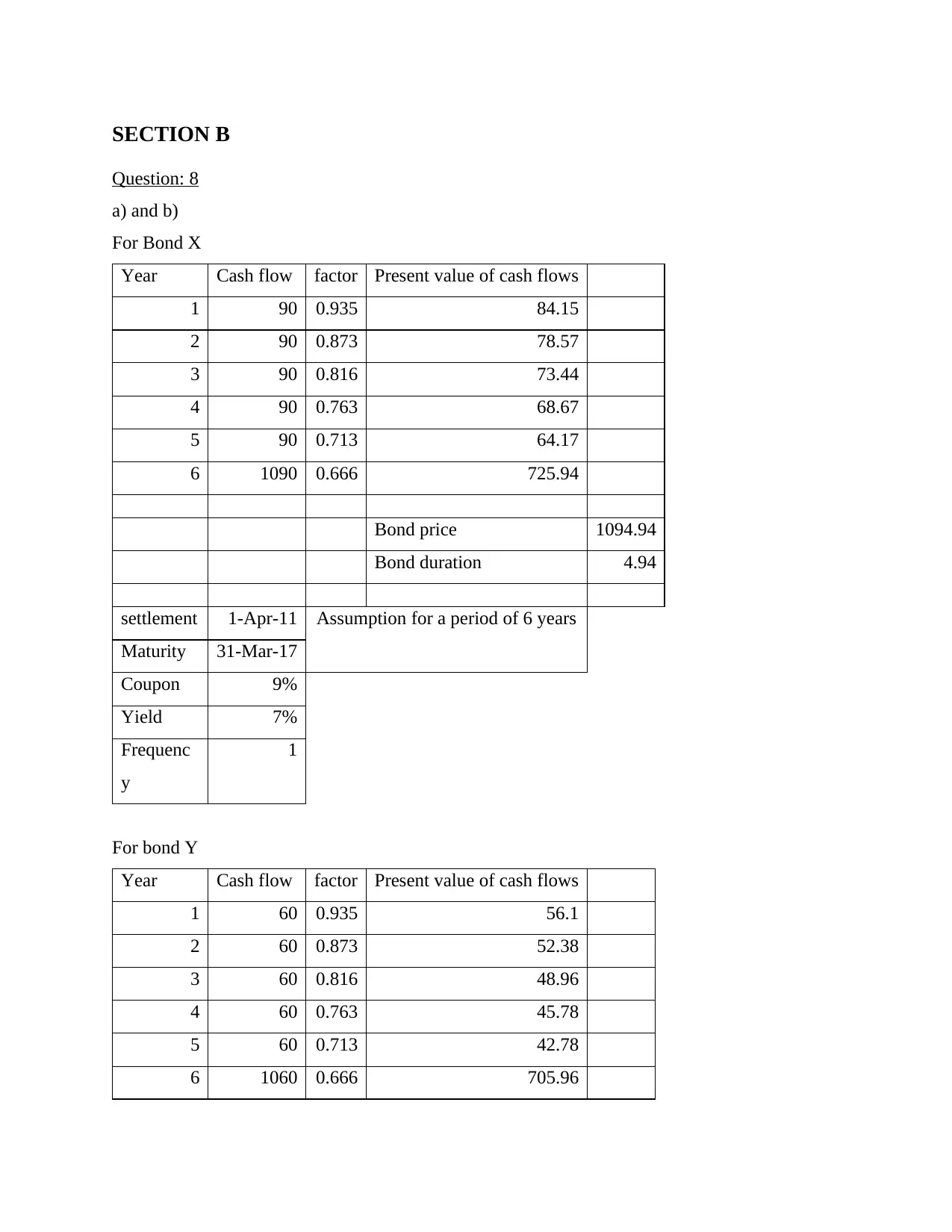
SECTION B
Question: 8
a) and b)
For Bond X
Year Cash flow factor Present value of cash flows
1 90 0.935 84.15
2 90 0.873 78.57
3 90 0.816 73.44
4 90 0.763 68.67
5 90 0.713 64.17
6 1090 0.666 725.94
Bond price 1094.94
Bond duration 4.94
settlement 1-Apr-11 Assumption for a period of 6 years
Maturity 31-Mar-17
Coupon 9%
Yield 7%
Frequenc
y
1
For bond Y
Year Cash flow factor Present value of cash flows
1 60 0.935 56.1
2 60 0.873 52.38
3 60 0.816 48.96
4 60 0.763 45.78
5 60 0.713 42.78
6 1060 0.666 705.96
Question: 8
a) and b)
For Bond X
Year Cash flow factor Present value of cash flows
1 90 0.935 84.15
2 90 0.873 78.57
3 90 0.816 73.44
4 90 0.763 68.67
5 90 0.713 64.17
6 1090 0.666 725.94
Bond price 1094.94
Bond duration 4.94
settlement 1-Apr-11 Assumption for a period of 6 years
Maturity 31-Mar-17
Coupon 9%
Yield 7%
Frequenc
y
1
For bond Y
Year Cash flow factor Present value of cash flows
1 60 0.935 56.1
2 60 0.873 52.38
3 60 0.816 48.96
4 60 0.763 45.78
5 60 0.713 42.78
6 1060 0.666 705.96
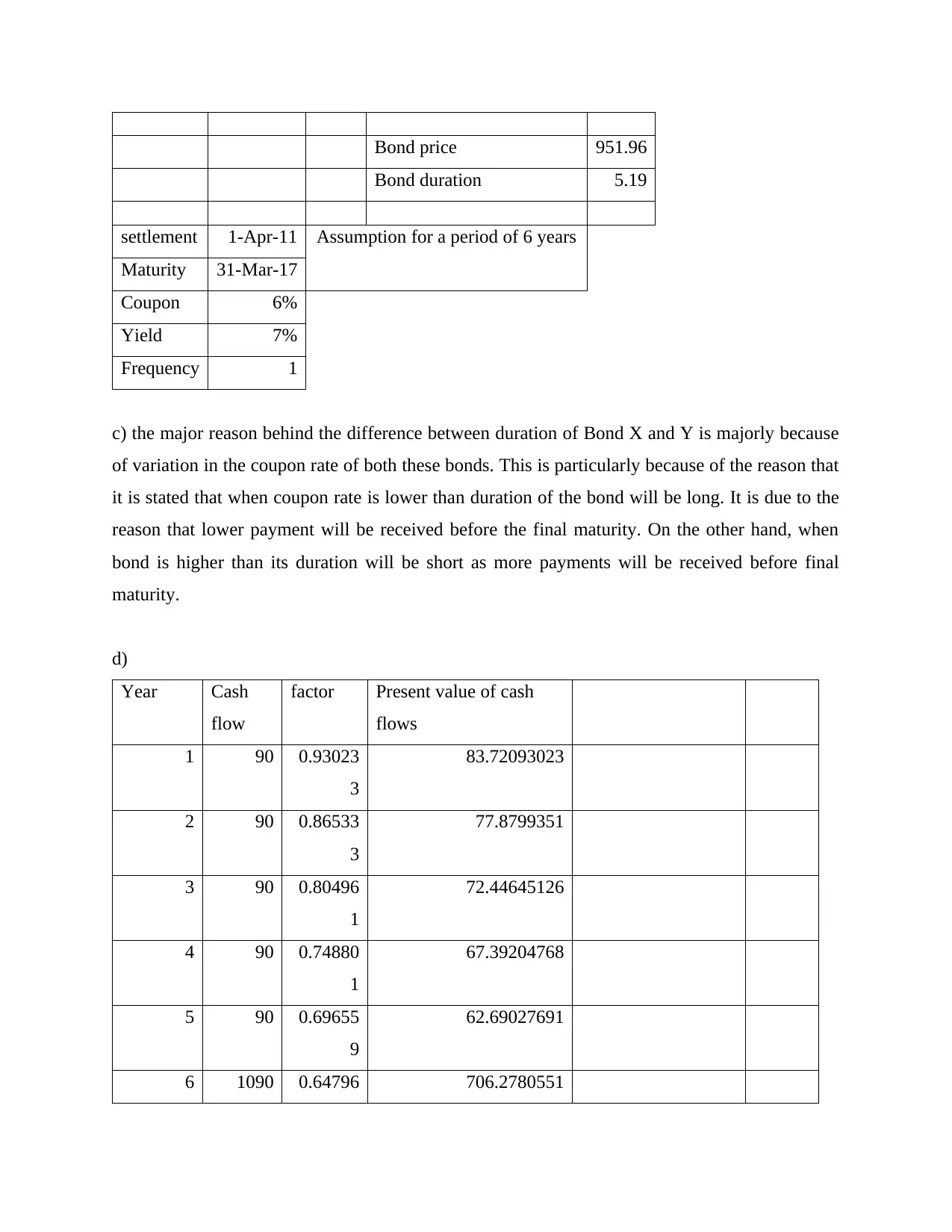
Bond price 951.96
Bond duration 5.19
settlement 1-Apr-11 Assumption for a period of 6 years
Maturity 31-Mar-17
Coupon 6%
Yield 7%
Frequency 1
c) the major reason behind the difference between duration of Bond X and Y is majorly because
of variation in the coupon rate of both these bonds. This is particularly because of the reason that
it is stated that when coupon rate is lower than duration of the bond will be long. It is due to the
reason that lower payment will be received before the final maturity. On the other hand, when
bond is higher than its duration will be short as more payments will be received before final
maturity.
d)
Year Cash
flow
factor Present value of cash
flows
1 90 0.93023
3
83.72093023
2 90 0.86533
3
77.8799351
3 90 0.80496
1
72.44645126
4 90 0.74880
1
67.39204768
5 90 0.69655
9
62.69027691
6 1090 0.64796 706.2780551
Bond duration 5.19
settlement 1-Apr-11 Assumption for a period of 6 years
Maturity 31-Mar-17
Coupon 6%
Yield 7%
Frequency 1
c) the major reason behind the difference between duration of Bond X and Y is majorly because
of variation in the coupon rate of both these bonds. This is particularly because of the reason that
it is stated that when coupon rate is lower than duration of the bond will be long. It is due to the
reason that lower payment will be received before the final maturity. On the other hand, when
bond is higher than its duration will be short as more payments will be received before final
maturity.
d)
Year Cash
flow
factor Present value of cash
flows
1 90 0.93023
3
83.72093023
2 90 0.86533
3
77.8799351
3 90 0.80496
1
72.44645126
4 90 0.74880
1
67.39204768
5 90 0.69655
9
62.69027691
6 1090 0.64796 706.2780551
⊘ This is a preview!⊘
Do you want full access?
Subscribe today to unlock all pages.

Trusted by 1+ million students worldwide
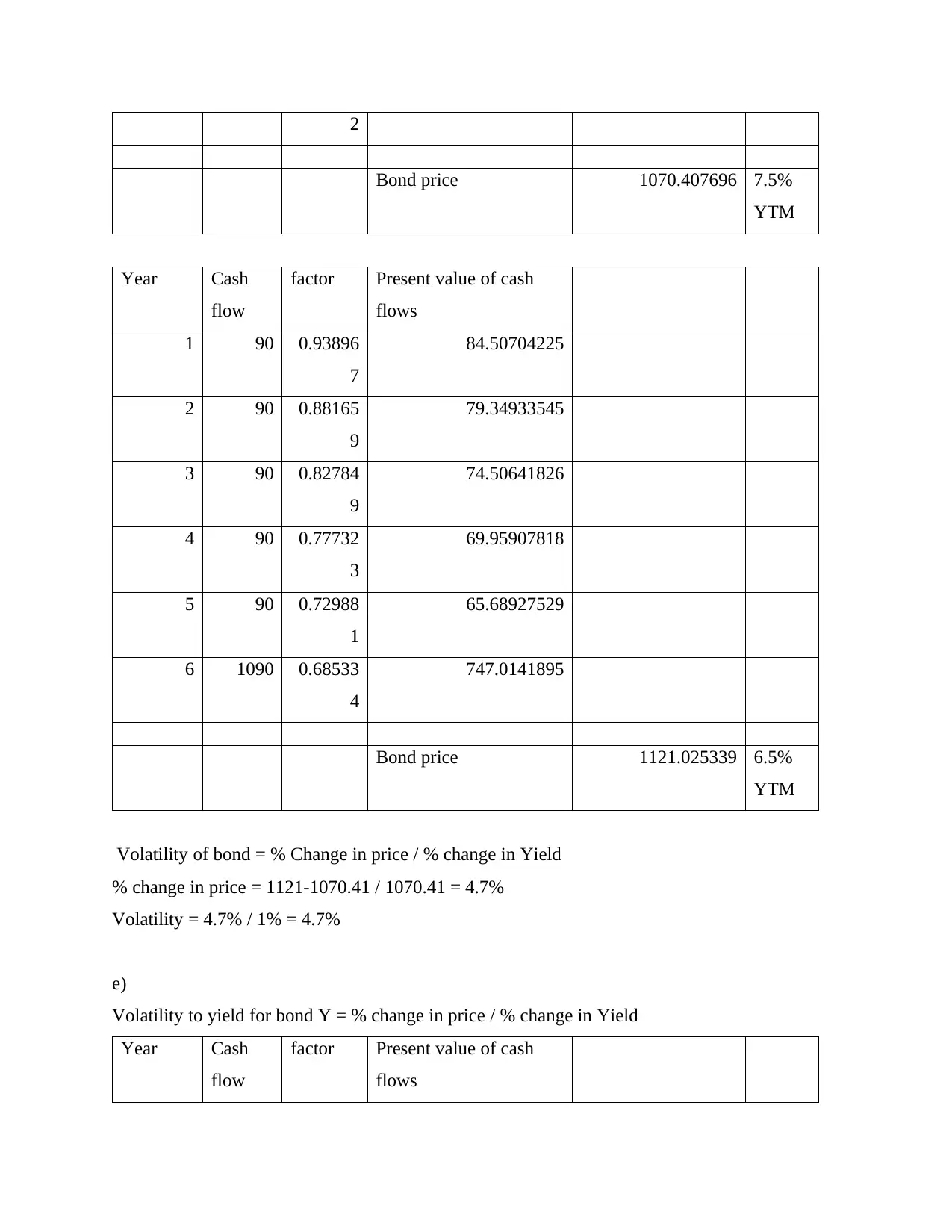
2
Bond price 1070.407696 7.5%
YTM
Year Cash
flow
factor Present value of cash
flows
1 90 0.93896
7
84.50704225
2 90 0.88165
9
79.34933545
3 90 0.82784
9
74.50641826
4 90 0.77732
3
69.95907818
5 90 0.72988
1
65.68927529
6 1090 0.68533
4
747.0141895
Bond price 1121.025339 6.5%
YTM
Volatility of bond = % Change in price / % change in Yield
% change in price = 1121-1070.41 / 1070.41 = 4.7%
Volatility = 4.7% / 1% = 4.7%
e)
Volatility to yield for bond Y = % change in price / % change in Yield
Year Cash
flow
factor Present value of cash
flows
Bond price 1070.407696 7.5%
YTM
Year Cash
flow
factor Present value of cash
flows
1 90 0.93896
7
84.50704225
2 90 0.88165
9
79.34933545
3 90 0.82784
9
74.50641826
4 90 0.77732
3
69.95907818
5 90 0.72988
1
65.68927529
6 1090 0.68533
4
747.0141895
Bond price 1121.025339 6.5%
YTM
Volatility of bond = % Change in price / % change in Yield
% change in price = 1121-1070.41 / 1070.41 = 4.7%
Volatility = 4.7% / 1% = 4.7%
e)
Volatility to yield for bond Y = % change in price / % change in Yield
Year Cash
flow
factor Present value of cash
flows
Paraphrase This Document
Need a fresh take? Get an instant paraphrase of this document with our AI Paraphraser
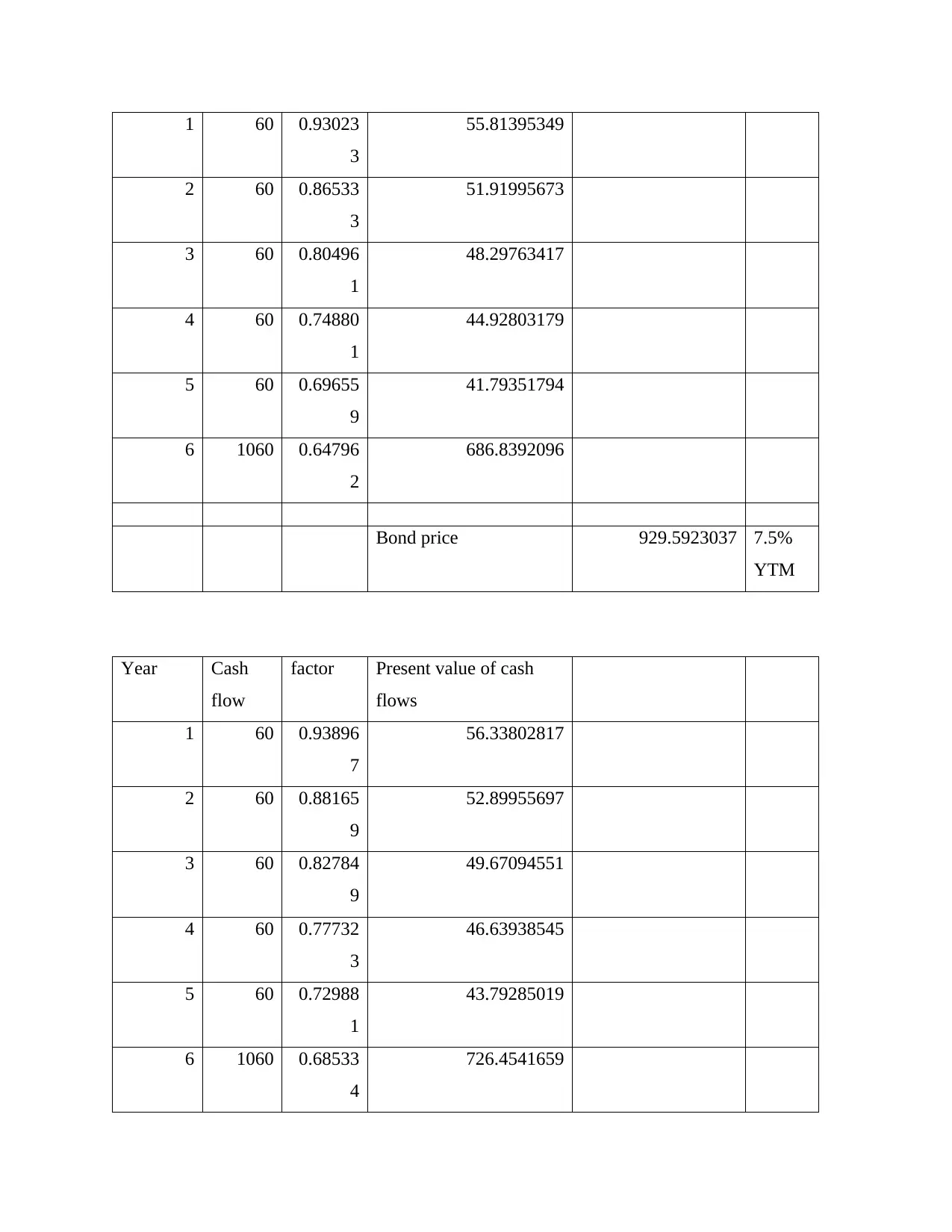
1 60 0.93023
3
55.81395349
2 60 0.86533
3
51.91995673
3 60 0.80496
1
48.29763417
4 60 0.74880
1
44.92803179
5 60 0.69655
9
41.79351794
6 1060 0.64796
2
686.8392096
Bond price 929.5923037 7.5%
YTM
Year Cash
flow
factor Present value of cash
flows
1 60 0.93896
7
56.33802817
2 60 0.88165
9
52.89955697
3 60 0.82784
9
49.67094551
4 60 0.77732
3
46.63938545
5 60 0.72988
1
43.79285019
6 1060 0.68533
4
726.4541659
3
55.81395349
2 60 0.86533
3
51.91995673
3 60 0.80496
1
48.29763417
4 60 0.74880
1
44.92803179
5 60 0.69655
9
41.79351794
6 1060 0.64796
2
686.8392096
Bond price 929.5923037 7.5%
YTM
Year Cash
flow
factor Present value of cash
flows
1 60 0.93896
7
56.33802817
2 60 0.88165
9
52.89955697
3 60 0.82784
9
49.67094551
4 60 0.77732
3
46.63938545
5 60 0.72988
1
43.79285019
6 1060 0.68533
4
726.4541659
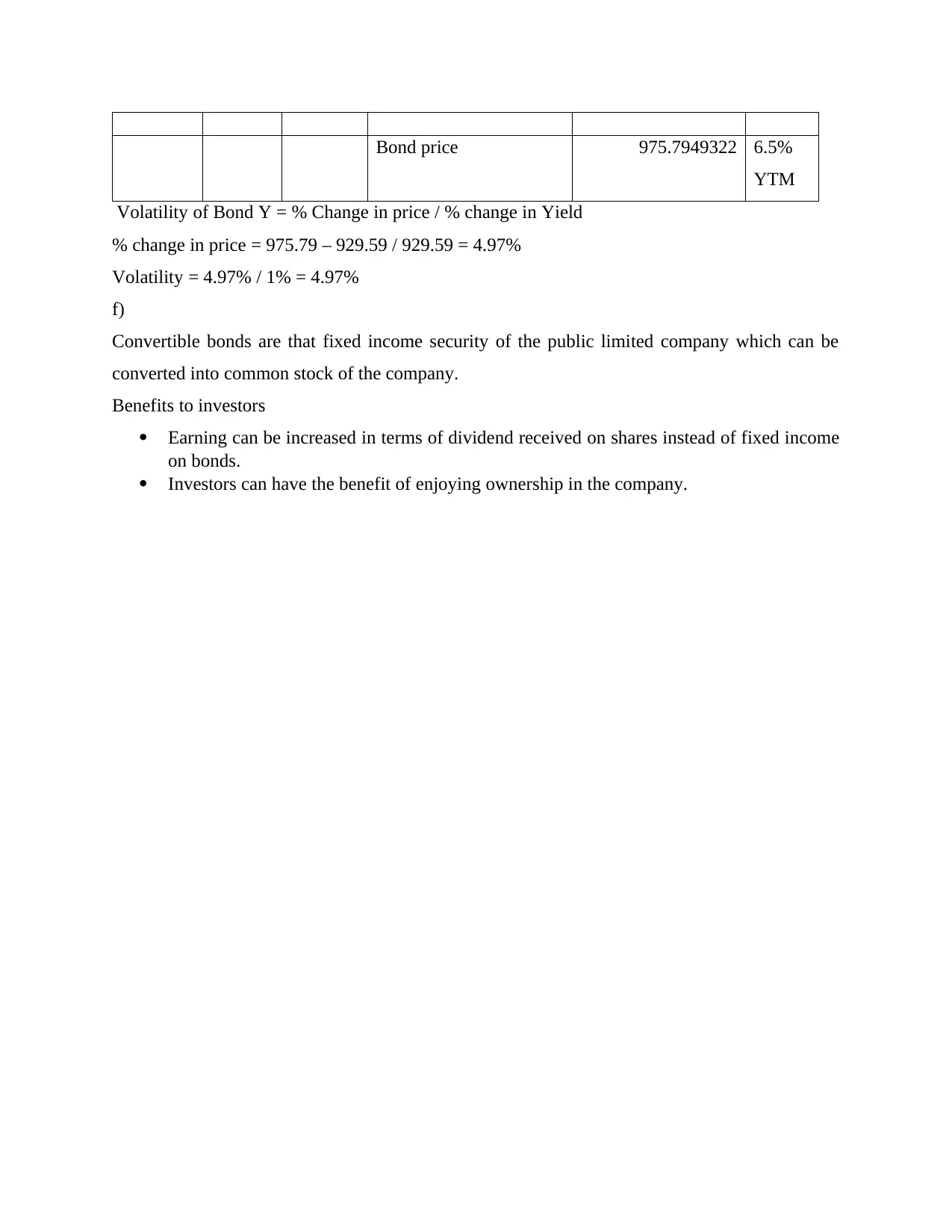
Bond price 975.7949322 6.5%
YTM
Volatility of Bond Y = % Change in price / % change in Yield
% change in price = 975.79 – 929.59 / 929.59 = 4.97%
Volatility = 4.97% / 1% = 4.97%
f)
Convertible bonds are that fixed income security of the public limited company which can be
converted into common stock of the company.
Benefits to investors
Earning can be increased in terms of dividend received on shares instead of fixed income
on bonds.
Investors can have the benefit of enjoying ownership in the company.
YTM
Volatility of Bond Y = % Change in price / % change in Yield
% change in price = 975.79 – 929.59 / 929.59 = 4.97%
Volatility = 4.97% / 1% = 4.97%
f)
Convertible bonds are that fixed income security of the public limited company which can be
converted into common stock of the company.
Benefits to investors
Earning can be increased in terms of dividend received on shares instead of fixed income
on bonds.
Investors can have the benefit of enjoying ownership in the company.
⊘ This is a preview!⊘
Do you want full access?
Subscribe today to unlock all pages.

Trusted by 1+ million students worldwide
1 out of 16
Related Documents
Your All-in-One AI-Powered Toolkit for Academic Success.
+13062052269
info@desklib.com
Available 24*7 on WhatsApp / Email
![[object Object]](/_next/static/media/star-bottom.7253800d.svg)
Unlock your academic potential
Copyright © 2020–2026 A2Z Services. All Rights Reserved. Developed and managed by ZUCOL.




